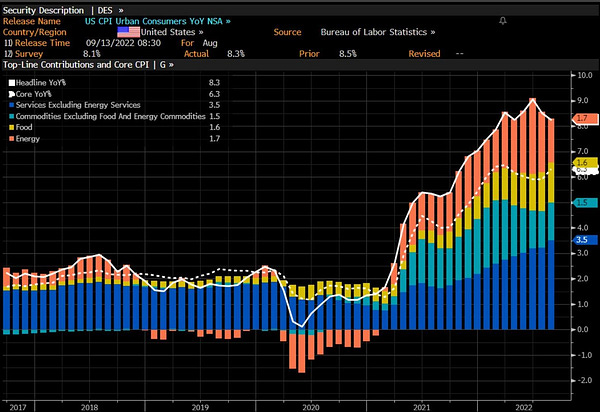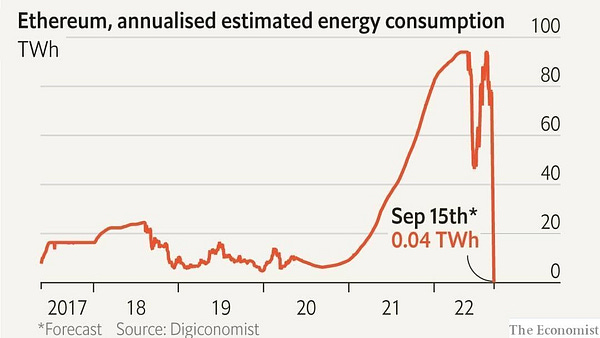Wrong, Wrong, and Wrong Again
The IMF Managing Director acknowledged that economists were wrong about inflation, economic growth, and the impact of the war in Ukraine. Can they get it right this time?
“We were proven wrong: wrong when Omicron hit, wrong when Russia invaded Ukraine, wrong when during this summer, climate shocks [affected] agricultural productivity.”
Kristalina Georgieva, Managing Director of the International Monetary Fund (IMF)
The Inflation Mess
In a candid admission of collective failure, the IMF Managing Director acknowledged that economists did not get many things right over the past 12 months. Now she says central banks must do everything they can to fight inflation. This fight will not be painless.
The US CPI (inflation index) for August was released and it was bad: 8.3 percent year-over-year. The market did not like this print as it meant that the Fed would continue to raise rates aggressively to try and tame inflation. The thread below offers a good summary of where inflation is in the US.



While the IMF is sending the message that central banks should do whatever it takes to get inflation under control, the World Bank is more cautious and is pointing out the risk for developing countries and how the world is at risk of entering a global recession.
Inflation is an insidious tax that penalizes the poor the most. Listen to how Warren Buffet described it. Even the US Dollar has lost 94 percent of its value during Warren Buffet’s life. It’s why it’s so important to invest and to not store your wealth in fiat currencies. They all converge to the same value: Zero.

Energy Crisis in Europe
There is still no sign of improvement in the upcoming energy crisis in Europe. In the meantime, it’s costing Europe a lot of money. Europe may end up spending as much as 11.7 of GDP this year on energy. France and Germany are nationalizing electricity and gas companies as fast as they can to avoid a collapse of the entire European energy sector.
A consequence of the sharp rise in Europe’s energy bill is that its trade deficit is plunging, taking down the euro with it. See below trade balance in billions of euros.

Nobody knows what this winter is going to look like for Europe, but it seems like Europeans aren’t talking to each other, or at least not enough!

If you want to know more about how Europe got there, you can read the article below and I highly recommend Doomberg’s interview in the list of best podcast episodes of the week at the end of the newsletter.
Markets
The US Dollar keeps getting higher, as measured by the DXY, an index measuring the US Dollar against a basket of other fiat currencies: Mostly Euro, Japanese Yen, and British Pound. These three fiat currencies are the currencies of three zones that are short energy, which is pressuring their exchange rate against the US Dollar. Interestingly, it turns out that there is an almost perfect inverse relationship between the strength of the US Dollar and that of… Bitcoin! The better the US Dollar is doing, the worse Bitcoin is doing, which makes intuitive sense as Bitcoin can be considered a hedge against the fiat system.
Both the stock and the bond markets continue to tank heavily as a result of the Fed hiking rates. Jim Bianco summarized the carnage happening in the bond market in the thread below.


But if you have cash, there is good news. Two-year US Treasuries now pay 3.87 percent. Granted, it’s still well below inflation, but it’s better than the 0.25 percent you get with a savings account.
It turns out the best traders may not be in New York or working for fancy hedge funds in Connecticut, they may be in Washington DC! The thread below highlights a few findings of a New York Times investigation that showed how politicians seem to often get great timing when it comes to stock trading.

Crypto
An historic event happened earlier this week: Ethereum, the second largest cryptocurrency after Bitcoin, transitioned from the computationally intensive Proof-of-Work consensus algorithm to a Proof-of-Stake consensus mechanism, where ETH holders stake their tokens in order to validate transactions.

The upgrade will result in the energy consumption of the Ethereum network decreasing to close to zero.


On the opposite side of the spectrum of cryptocurrencies, central banks are working on their own version: Central Bank Digital Currencies (CBDCs). If you want to know what CBDCs are about, all you have to do is listen to the head of the Bank for International Settlements (the central bank of the central banks): It’s all about control. Controlling your money and what you can or cannot do with it.
Authoritarian regimes can’t wait to be able to use such a tool to suppress political opponents or any form of dissent. Fortunately, in the US there is still resistance to this concept. Watch the president of the Federal Reserve Bank of Minneapolis explain why a CBDC is not needed and could be dangerous.
















